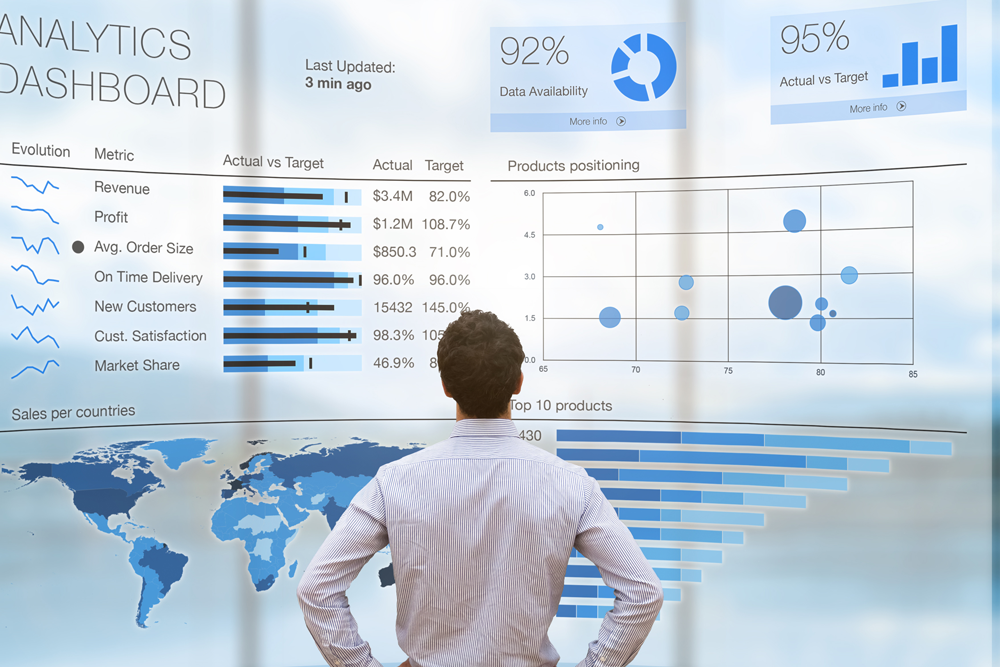What Is The Relationship Between KPIs And Big Data?
2 July 2021
The relationship between big data and KPIs may not be immediately obvious. KPIs are what you use to measure performance, while big data is what Netflix uses to decide which series to recommend to you next, right? That’s true, but big data, KPIs and performance measurement are inextricably linked. And, as we’ll see in this article, big data has drastically altered how companies measure performance.

Connecting the dots between big data and KPIs
The increasing datafication of our world has changed what we can measure, and how. What do I mean by datafication? I mean the huge volumes of data that we are generating every single day – every time we go online, every time we pay for something with a credit card, every time we touch in with an Oyster card on the London Underground, every time my seven-year-old asks Alexa to play their favourite song for the hundredth time that day…
This exponential increase in data means that companies have more options for measuring performance than ever before. They have more data at their disposal (and, importantly, more real-time data). And they have more options for analysing and reporting that data. As a result, there are many new types of indicators for tracking performance.
Positive ways big data has impacted KPIs
Big data has helped to overcome two major limitations of traditional KPIs: firstly, that too many KPIs are standard proxies (such as generic surveys) and, secondly, that many are lagging indicators, telling us what’s already happened. The value of proxy tools or lagging indicators in today’s fast-paced business world is increasingly limited.
Now, instead of using a standard survey to monitor staff engagement, you can monitor actual employee behaviour. While surveys are useful as a starting point or for benchmarking purposes, they have their weaknesses. For starters, people often lie on surveys – whether it’s because they’re wary of reprisals if they tell the truth, they feel they should tell the company what it wants to hear, or it’s simply not in the individual’s interests to tell the truth.
Big data technology means it’s possible to track actual behaviour. Or, to put it another way, we can understand what people really do, not what they say they do.
Importantly, these KPIs are becoming increasingly rooted in real time. Instead of measuring past performance (last week, last month or last quarter, for instance), big data means it’s now possible to track what’s happening right now, in real time, or even predict future performance more accurately.
Exciting new ways of measuring performance
Here are just a few of the ways companies are using big data-related technology to improve their performance measurement.
- Tracking physical user behaviour – such as how customers move around a retail space, or how employees interact with the physical workplace. The proliferation of sensors in everything from vehicles to office chairs means it’s now possible to gather information on pretty much any aspect of human behaviour.
- Tracking online behaviour – this may include tracking how customers navigate a website, or what people are reading, viewing, sharing or recommending.
- Social listening – this involves monitoring social media to better understand and measure brand interactions, number of brand mentions or the underlying sentiment when customers mention your product or service.
- Gathering conversation data – similar to social listening, this involves gathering relevant data from conversations, whether face-to-face interactions or via email, messaging apps, phone calls, and so on.
- HappyOrNot devices – these terminals gather real-time feedback on how happy people are with a service or environment.
What about the disadvantages?
Of course, for any kind of people-related data, there are privacy and ethical issues to consider. So it’s important you gather only the critical data you need to improve business performance, rather than gather every little bit of data just for the sake of it. It’s also important to be transparent with customers and employees about what data you’re collecting, why, and how it benefits them.
But, setting aside potential privacy pitfalls, perhaps the biggest disadvantage big data has brought to KPIs is information overload. The biggest challenge used to be finding the right data; now, the biggest challenge is narrowing down the seemingly unlimited options!
With so many options for measuring performance, companies can split into two camps: those who get overwhelmed and bury their head in the sand, ignoring the overwhelming options (thereby passing up some juicy insights that could really help boost performance); or those who jump in feet first, and capture data on anything and everything, just because they can, and regardless of whether or not it benefits the business.
Staying focused in a big data-driven world
It’s never a good idea to start collecting masses of data that you don’t really need, just because you can. Big data’s ability to transform KPIs for the better isn’t about collecting impressive amounts of data or slicing and dicing that data in lots of different ways. Rather, the power of big data lies in how you use it; and, in the case of KPIs and performance management, that means gathering the insights that will help people in the company make better decisions and improve performance.
Therefore, the best way to overcome the information overload problem is to stay focused on what it is you need to know. Focus on your business challenges and identify the questions you need to answer to overcome those challenges and meet your strategic goals. Then, once you know what questions you need to answer, you can design the most useful KPIs and gather the best data to help you answer them.
Where to go from here
If you would like to know more about KPIs and performance management, check out my articles on:
- What Are SMART KPIs? (Spoiler: They Don’t Really Exist!)
- What is a KPI? A Simple Explanation For Everyone
- What is Big Data?
Or browse the KPI or Big Data sections of this website for hundreds of related articles.
Related Articles
How Can We Use AI to Address Global Challenges Like Climate Change?
As climate change continues to pose an enormous threat to our planet, we must explore innovative solutions that can help mitigate its impact.[...]
6 Roadblocks Stopping Web3 And The Metaverse Becoming A Reality
With the emergence of the metaverse and web3 technologies, it’s clear that the next evolution of the internet is already underway.[...]
The Future Of Factories: 3 Ways To Navigate The Industrial Metaverse
What is the industrial metaverse, you ask? Well, we’re not talking about a separate metaverse exclusively for manufacturers..[...]
The Five Questions Every CEO Must Answer About Sustainability
The future of business is green. As a CEO, the ball is in your court to make sustainability an integral part of your corporate strategy.[...]
Debunking The Top 5 Quantum Computing Myths
It makes sense that most people don’t understand quantum computing.[...]
Mastering Teamwork: Top 10 Strategies for Better Collaboration at Work
The nature of teams may be changing as more and more people work remotely, but the truth is businesses will always want people on their teams who can work well with others.[...]
Sign up to Stay in Touch!
Bernard Marr is a world-renowned futurist, influencer and thought leader in the fields of business and technology, with a passion for using technology for the good of humanity.
He is a best-selling author of over 20 books, writes a regular column for Forbes and advises and coaches many of the world’s best-known organisations.
He has a combined following of 4 million people across his social media channels and newsletters and was ranked by LinkedIn as one of the top 5 business influencers in the world.
Bernard’s latest book is ‘Generative AI in Practice’.










Social Media